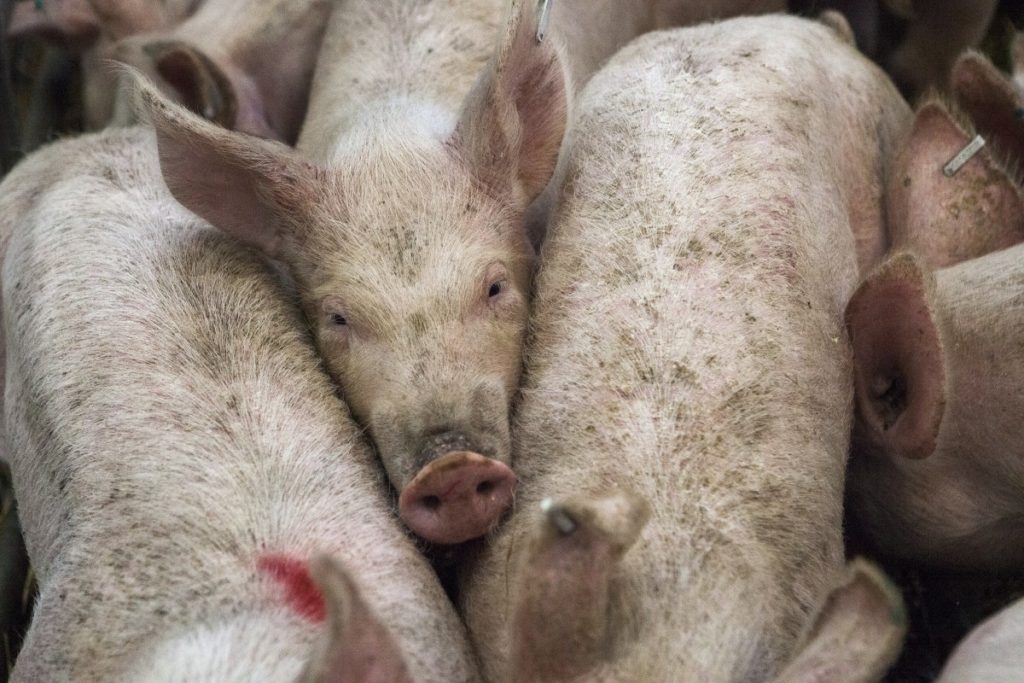In June 2011, Mercy for Animals released footage taken by undercover activists depicting the bloody debeaking of poultry and gross confinement of breeding sows on factory farms, animal cruelties that are standard practices in the animal agriculture industry. Fearing damage to its nearly $5.7 billion pork industry, Iowa was swift to act. The following spring, the state passed a law that criminalized obtaining access to industrial animal agriculture facilities under “false pretenses”; investigative journalists and activists who misrepresented their intentions in job applications to such facilities faced up to a year in prison. This past January, a judge struck down the 2012 law for violating the First Amendment. However, similar laws continue to muzzle agricultural whistleblowers around the country. To secure their fundamental right to free speech and hold the animal agriculture industry accountable, Americans must act to end ag-gag laws once and for all.
Ag-Gag and the Constitution
The term “ag-gag” reflects the animal agriculture industry’s campaign to silence those who would expose its backroom practices. Often, ag-gag laws prohibit “agricultural interference,” such as recording industrial operations absent companies’ permission, and “agricultural fraud,” such as gaining access to industrial facilities under false pretenses. Some establish a mandatory time frame for turning over any recordings produced in these facilities to legal authorities. While ultimately vetoed, a bill of this kind was introduced in the Tennessee House and Senate in 2013, which later introduced a bill to establish a private right of action against activist-employees documenting facility areas inaccessible to the general public.
The kinds of undercover investigation ag-gag laws target are not unconstitutional. False speech, including that of undercover actors misrepresenting their intentions in job applications, is not inherently unprotected. Rather, as the Supreme Court declared in the 2012 case of United States v. Alvarez, false speech fails to receive constitutional protection when it produces a “legally cognizable harm” like defamation, often at the speaker’s material benefit. Citing this precedent, the Iowa judge upheld the First Amendment rights of undercover actors, stating that the 2012 law failed to meet both intermediate and strict scrutiny. Whether “investigative deceptions or innocuous lies,” the judge affirmed, these false statements remain “protected by our country’s guarantee of free speech and expression.”
Industry Opposition to Whistleblowing
Despite their unconstitutionality, the animal agricultural industry continues to push ag-gag laws for one reason: whistleblowing works. The approval of the 2012 Iowa law led to a complete stop in undercover investigations into the industry. Without such investigations, there is less public awareness and less pressure to change troubling industry practices. In addition to animal cruelties, undercover investigations of factory farms and industrial slaughterhouses have also exposed non-compliance with environmental and public health regulations and worker maltreatment. Infamously, Upton Sinclair’s description of the horrific and inhumane conditions of the Chicago meatpacking industry in The Jungle, published in 1904, inspired a federal investigation into the industry and ultimately the passage of new federal food laws. Modern documentation of industry practices such as “culling,” or grinding up male chicks deemed useless for the egg industry in wood chippers, has similarly galvanized the public and inspired legislative change.
While the growing movement to strike down ag-gag laws is promising, the animal agriculture industry remains a powerful force of opposition. According to the American Society for the Prevention of Cruelty to Animals, which has helped defeat ag-gag laws in over 20 states, only seven states currently have ag-gag laws on the book. However, that has not stopped the industry from continuing to lobby for new and even harsher restrictions on agricultural whistleblowers to keep its operations out of the public eye.
Fighting for First Amendment Freedoms
In threatening journalists’ and activists’ freedom of expression, ag-gag laws set a dangerous precedent of undermining undercover investigations more broadly. As ACLU Staff Attorney Esha Bhandari explains, undercover operations have been crucial in uncovering identity-based discrimination around traits such as race and gender. Dismantling ag-gag laws can help preserve this valuable work, which is at the center of the ACLU’s current defense of researchers’ right to provide housing and job opportunity websites with false information in order to determine whether they perpetrate algorithmic discrimination.
With a report from the UK NGO Article 19 showing threats to journalists worldwide at a 10-year-high and freedom of expression coming under increasing attack in the United States, notably from the White House, striking down ag-gag laws is an important test of Americans’ commitment to First Amendment freedoms. The Constitution is clear, but the realization of its promises of individual liberty depends upon citizen action, especially in the face of growing opposition from industry and even government. By raising awareness of such laws’ existence and supporting challenges to their constitutionality, citizens can help defend the rights of undercover investigators and exercise the very freedom they are fighting to protect.
Image Source: Google Images/Pxhere
